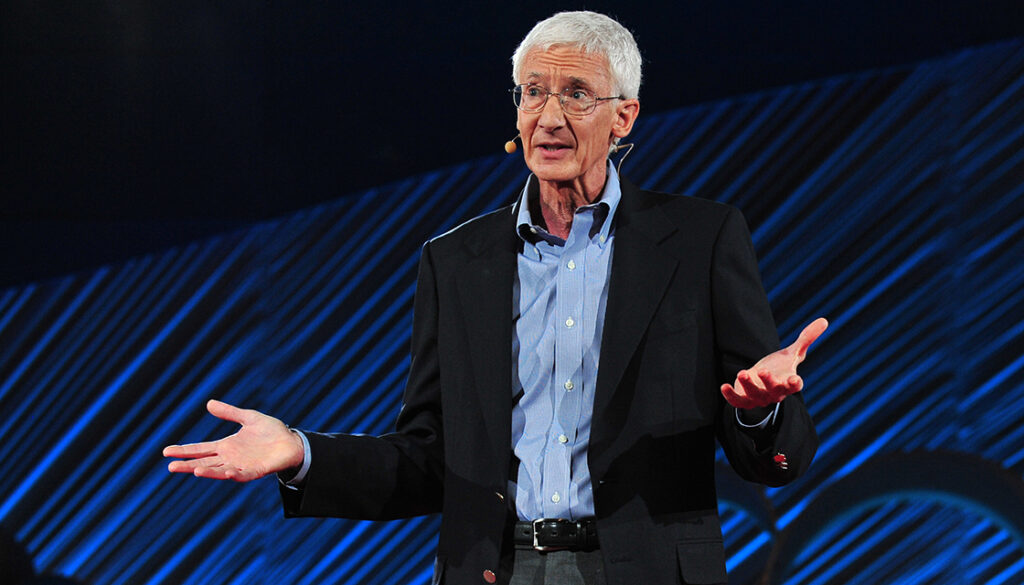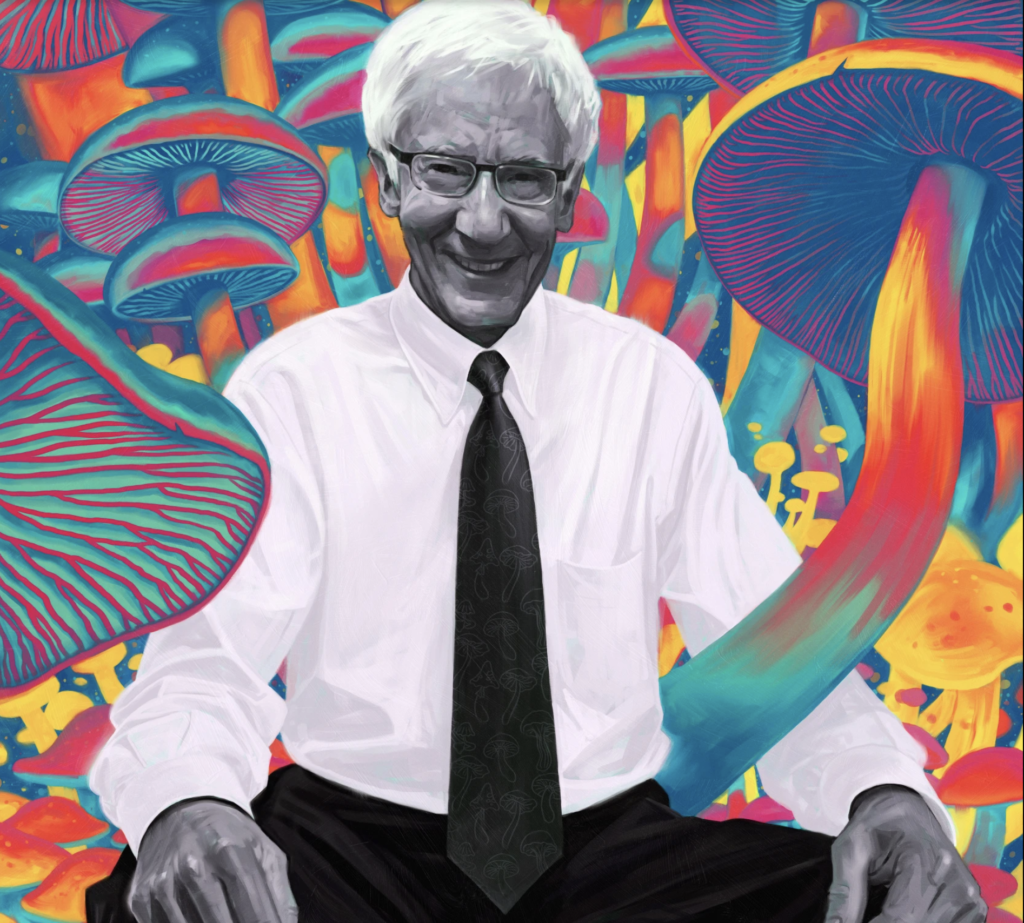
Holistic Primary Care honors the memory and legacy of Roland Redmond Griffiths, PhD, a visionary neuroscientist and psychopharmacologist who was among the leaders of the recent renaissance of serious clinical research on psychedelics.
Griffiths died at the age of 77 of metastatic colon cancer on October 16, 2023, at his home in Baltimore, MD.
He was widely known and well respected for his forward-looking research on the therapeutic potential of psilocybin for the treatment of depression and substance abuse disorders, and in the context of end-of-life care.
His 2006 double-blind study describing the impact of psilocybin on 30 volunteers who had never taken any psychedelic substances before, was hailed as a landmark. For the first time in decades, neuroscientists and pharmacologists at a major academic center were exploring the possibility that psychoactive compounds from mushrooms could have medical value.
Under Griffiths’ leadership, Johns Hopkins quickly became a hub for a new wave of psychedelic research, along with New York University and University of California, Los Angeles.
Leading a Revival
Griffiths’ meticulous approach garnered considerable respect among his scientific colleagues, as well as attention to a field that had been largely discredited by the medical world since the early 70s. His research emerged amid a groundswell of renewed public interest in psychedelics for personal growth.
“I became interested in studying psychedelics after initiating a regular meditation practice about 25 years ago. I was intrigued by the idea that for millennia different cultures had developed techniques of exploring the inner subjective landscape of mind. “
By 2019, Griffith and his colleagues had received upwards of $17 million in philanthropic endowments which were put toward the creation of the Center for Psychedelic and Consciousness Research at Johns Hopkins. It quickly became one of the world’s premier institutes for the study of psychedelics, drawing talent from all over the world, and serving not only as a research center but also a training program for practitioners interested in facilitating psychedelic-augmented therapies.
One of the center’s first triumphs was a 2020 study published in JAMA Psychiatry looking at the impact of psilocybin on depressive symptoms in a cohort of people with major depression or depressive symptoms associated with a cancer diagnosis. The Hopkins researchers showed that two psilocybin sessions in the context of supportive psychotherapy gave “substantial, rapid, and enduring antidepressant effects.”
Early Interest in the Mind
Interest in the nature of the mind was something Roland Griffith shared with his father, William, a psychologist who later became a professor of public health at the University of California, Berkeley.
Born in Glen Cove, NY, and raised in El Cerrito, Roland earned a PhD in psychopharmacology from the University of Minnesota in 1972. Shortly thereafter, he joined the research and teaching faculty at Johns Hopkins University, where he developed a remarkable and impactful career.
He was already a major figure in psychopharmacology when he started researching psychedelic drugs, especially psilocybin, in 1999. His earlier work on the addictive nature of caffeine and the realities of caffeine withdrawal led to inclusion of this particular syndrome in the Diagnostic and Statistical Manual of Mental Disorders (DSM-5). It also informed FDA regulations regarding caffeine in energy drinks, and pre-packaged products containing alcohol and caffeine.
“Roland’s research with caffeine was elegant, systematic and thorough,” says Eric Strain, director of the Behavioral Pharmacology Research Unit at Johns Hopkins, in a university news release announcing Griffiths’ death. “It was not only scientifically impressive, but it also really helped to reveal that there were people who truly struggled to control their caffeine use and, under some circumstances, would go to incredible lengths to get caffeine. His caffeine work alone would be an impressive career for most scientists.”
“I count myself among the very conservative with respect to the movements afoot to legalize and decriminalize psychedelics at scale. I am concerned that there are some totally unrealistic expectations of benefits that are going to be forthcoming without sufficient attention to potential catastrophic risk to individuals and then more broadly to culture,”
Over the course of his career, Griffiths also studied other mood-altering drugs, including nicotine, sedatives, and alcohol. Beyond strictly academic work, he served as a consultant to the National Institutes of Health, to numerous pharmaceutical companies, and to the World Health Organization’s Expert Committee on Drug Dependence.
The Discipline of Meditation
Roland Griffiths’ interest in psilocybin and other psychedelics arose not from the counterculture zeal of the 1960s, or from far-flung travel. Rather, it emerged from decades of meditation practice. He became involved with the Siddha Yoga meditation community in the early 1990s, and this discipline became a central feature of his life.
“I became interested in studying psychedelics after initiating a regular meditation practice about 25 years ago. I was intrigued by the idea that for millennia different cultures had developed techniques of exploring the inner subjective landscape of mind. In 1994, I began attending some local meditation programs, and I became fascinated by meditation experiences and their implications,” Griffiths said in an extensive interview published in the Johns Hopkins Magazine, last summer.
“The usual beginning meditation instruction sounds so simple. Just sit quietly and follow your breath or repeat a mantra. Simple until you try it. And then you realize you don’t have much, if any, agency at all over what’s coming into consciousness. For me, I became very aware of the voice in my head that was giving me a running commentary on who I was. I started listening to what that voice was saying and it was quite appalling.”

A major breakthrough came when Griffiths realized that those voices in his mind—and the things they repeated ad infinitum—were not, in actuality him.
“If you treat the voice in your head as being you, then you may find you have one very judgmental, irritable overseer. And the goal would be to say to yourself, “Well, thank you very much for your opinion, but I’m choosing not to follow it.”
Psychedelics such as psilocybin can help people experience something other than the merciless mental overseers that they’ve always taken to be “themselves.”
“We know that there are neurochemical, neurophysiological, and brain network changes that likely account for the effects we feel. These effects may result in enduring changes apart from the experience,” Griffiths stated.
“For those of us in research, and those who have personal experience with psychedelics, it seems to be undeniable that the resulting change in sense of self and worldview is also critically important to the ultimate outcome. Under the correct conditions, people have experiences that can be described as transcendent, an interconnectedness of all people and things. Along with this sense of connectedness arises a sense that the experience is precious—or sacred, if you want to use religious terminology —and that it is absolutely true.”
Supportive, But Cautious
Roland Griffiths showed a boundless enthusiasm for the potential of psilocybin. But he was also very conscious of the potential for problems arising from widespread, unguided, and uninformed use of this and other potent consciousness-altering substances.
“I count myself among the very conservative with respect to the movements afoot to legalize and decriminalize psychedelics at scale. I am concerned that there are some totally unrealistic expectations of benefits that are going to be forthcoming without sufficient attention to potential catastrophic risk to individuals and then more broadly to culture,” he said.
“We don’t want to replicate what happened in the 1960s” he adds, noting that the almost evangelical zeal of early LSD researchers like Timothy Leary ultimately resulted in a “reflexive kickback from the culture at large,” that dead-stopped research on psychedelic medicine for years.
Confronting Mortality
With one foot firmly rooted in rational, reductionistic biomedicine, and the other leaping into the mysteries of cosmic consciousness, Griffiths had a unique perspective on his own life and imminent death.
“I started to explore the many psychological states that one could inhabit with such a diagnosis: fear and depression, anger, denial, fight mode. Another option would be to
“If you treat the voice in your head as being you, then you may find you have one very judgmental, irritable overseer. And the goal would be to say to yourself, “Well, thank you very much for your opinion, but I’m choosing not to follow it.”
adopt a set of beliefs that allow you to celebrate death because it’s going to lead to a wonderful afterlife. The latter just wasn’t available to me because I’m a skeptic by nature. Although I certainly don’t know what happens when we die, I put a low probability on many of the possibilities that are held out by some cultures and that appear, to me, to be largely fanciful in terms of a joyful ever after.”
“But what was on offer, and what initially drew me to meditation and into the study of psychedelics and the mind, was another option. For me, it’s the practice of gratitude. It’s the practice of the absolute wonder that we are these highly evolved sentient creatures who can hear and see and taste and locomote and build things. We have developed technologies and science for discovering things. We have developed culture. And yet the most interesting piece of all is that we are aware that we’re aware. I’m here, and I know I’m here.”
“So, to whatever extent I had thought myself to be “awake” prior to the diagnosis, there was this new sense of pristine awareness … of mindfulness. I explored the unfruitful states of mind for a few days, maybe a week after the diagnosis, and then emerged into this sense of joyful celebration. I found myself to be present, aware, astonished, and deeply grateful for the gift of existence.”
A Lasting Legacy
Over his 50 years at Johns Hopkins, Roland Griffiths published more than 400 studies and book chapters. He trained hundreds of researchers and clinicians, and enriched the lives of thousands of patients struggling with a wide range of physical and psychological ailments.
In the months before his passing, he revised his will to create a $24 million endowed professorship—the largest in the long history of Johns Hopkins School of Medicine—with the objective of advancing research on psychedelic substances and their effects on human consciousness and society.
“We know from research and experience that psychedelics can occasion profound awakenings that have substantial and sustained personal meaning and spiritual significance. We also know, based on research and observation, that such experiences can produce enduring positive changes in prosocial attitudes and behavior, opening individuals to the realization that we are all in this together with the attendant impulse toward mutual caretaking in service of human flourishing,” he wrote in the professorship’s mission statement. “Although it might sound like an overstatement, I truly believe this line of research may be critical to the survival of our species.”
Dr. Griffiths lived long enough to see his protégé and colleague David Yaden become the inaugural recipient of the Roland R. Griffiths, Ph.D. Professorship Fund in Psychedelic Research on Secular Spirituality and Well-Being.
He married thrice, most recently to news reporter and health educator, Marla Weiner. He had three children and 5 grandchildren
END







